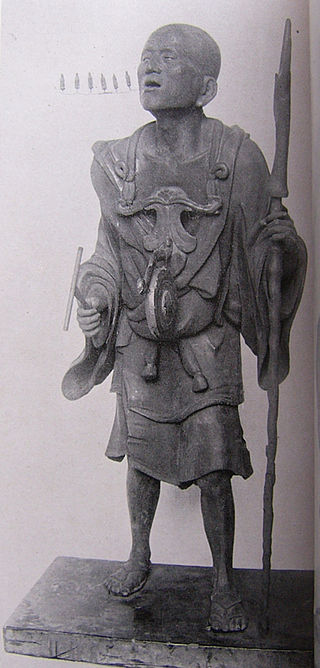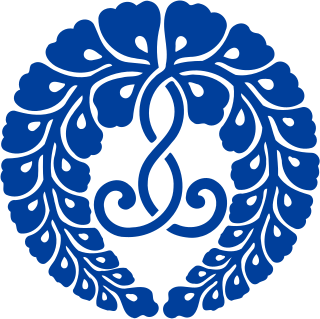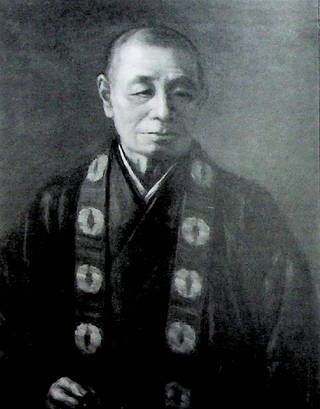Related Research Articles

Shinran was a Japanese Buddhist monk, who was born in Hino at the turbulent close of the Heian Period and lived during the Kamakura Period. Shinran was a pupil of Hōnen and the founder of what ultimately became the Jōdo Shinshū sect of Japanese Buddhism.

Jōdo Shinshū, also known as Shin Buddhism or True Pure Land Buddhism, is a school of Pure Land Buddhism. It was founded by the former Tendai Japanese monk Shinran.

Nianfo in Chinese, or Nembutsu (Japanese) is a term commonly seen in Pure Land Buddhism. In the context of Pure Land practice, it generally refers to the repetition of the name of Amitābha. It is a translation of Sanskrit buddhānusmṛti.

Daisetsu Teitaro Suzuki, self-rendered in 1894 as "Daisetz", was a Japanese-American essayist, philosopher, religious scholar, translator, and writer. He was a scholar and author of books and essays on Buddhism, Zen and Shin that were instrumental in spreading interest in both Zen and Shin to the West. Suzuki was also a prolific translator of Chinese, Japanese, and Sanskrit literature. Suzuki spent several lengthy stretches teaching or lecturing at Western universities, and devoted many years to a professorship at Ōtani University, a Japanese Buddhist school.

Rennyo was the 8th Monshu of the Hongan-ji Temple of the Jōdo Shinshū sect of Buddhism, and descendant of founder Shinran. Jodo Shinshu Buddhists often referred to him as the restorer of the sect. He was also known as Shinshō-in (信証院), and posthumously Etō Daishi (慧灯大師). During the conflict of the Ōnin War and the subsequent warfare that spread throughout Japan, Rennyo was able to unite most of the disparate factions of the Jodo Shinshu sect under the Hongan-ji, reform existing liturgy and practices, and broaden support among different classes of society. Through Rennyo's efforts, Jodo Shinshu grew to become the largest, most influential Buddhist sect in Japan.

The term American Buddhism can be used to describe all Buddhist groups within the United States, including Asian-American Buddhists born into the faith, who comprise the largest percentage of Buddhists in the country.
In East Asian Buddhism, Shakyamuni Buddha of the Essential Teachings of the Lotus Sutra is considered the eternal Buddha. In the sixteenth chapter of the Lotus Sutra, Shakyamuni Buddha reveals that he actually attained Buddhahood in the inconceivably remote past. The Eternal Buddha is contrasted to Shakyamuni Buddha who attained enlightenment for the first time in India, which was taught in the pre-Lotus Sutra teachings.

Hongan-ji, also archaically romanized as Hongwanji, is the collective name of the largest school of Jōdo Shinshū Buddhism. 'Hongan-ji' may also refer to any one of several actual temple buildings associated with the sect. Nishi Honganji (西本願寺) and Higashi Honganji (東本願寺) are two major temples in Kyoto.

The Buddhist Churches of America is the United States branch of the Nishi Honganji subsect of Jōdo Shinshū Buddhism.
Kiyozawa Manshi was a Japanese Shin Buddhist reformer and priest of samurai background who studied at Tokyo University in Western philosophy under the American philosopher Ernest Fenollosa. He belonged to the Ōtani-ha branch of Shin Buddhism.
Kaneko Daiei was a Japanese Shin Buddhist philosopher and priest during the first half of the 20th century, belonging to the Ōtani-ha branch of Shin Buddhism. He was born to the priest of Saiken-ji, a Shin Buddhist temple in Jōetsu, Niigata Prefecture. He attended Shinshu University from 1901 when it was under the new leadership of Kiyozawa Manshi. It was at this time that he met and became close to Soga Ryojin. After graduating, he returned home and worked to propagate the ideas of Kiyozawa. In 1916, Kaneko took up a position on the faculty of Ōtani University. In 1925 and 1926, he published three works that took a controversial position on the nature of the Pure Land, and the authorities within the Higashi Hongan-ji judged his views to be heretical. In 1928, he resigned his professorship under pressure, and was suspended from the priesthood. He had to leave Kyoto and take up a position teaching at Hiroshima Bunkyo University. During this time, he continued to write, to publish, and to give Dharma talks all around the country. In 1941, the Jodo Shinshu leadership reinstated his priestly faculties and had him return to Ōtani University.
Alfred Bloom was an American Shin Buddhism scholar, who pioneered Jōdo Shinshū studies in the English-speaking world.

The Institute of Buddhist Studies is a Jodo Shinshu-affiliated seminary and graduate school, located in Berkeley, California. It is a member school of the Graduate Theological Union, also located in Berkeley. Its mission is to provide graduate level education in the entirety of the Buddhist tradition with specialization in Jodo Shinshu ministry and Buddhist chaplains. It is the sole seminary for ministers serving temples in the United States through the Buddhist Churches of America, the U.S. mainland branch district of the Nishi Hongwanji sect of Japanese Buddhism.

Senshō Murakami was a Meiji period Buddhist scholar and Jodo Shinshu priest. He famously introduced Western scholarship on Buddhism for Japan, and because of this was forced to resign from Japanese Buddhist priesthood. However, ten years later he was reinstated into the priesthood. He belonged to the Ōtani-ha branch of Shin Buddhism.

Ōtani-ha is a Japanese Buddhist movement. It belongs to Jōdo Shinshū, also known as Shin Buddhism. The movement has approximately 5.5 million members.
Kenneth Ken'ichi Tanaka, also known as Kenshin Tanaka or Ken'ichi Tanaka is a scholar, author, translator and ordained Jōdo Shinshū priest. He is author and editor of many articles and books on modern Buddhism.
James Carter Dobbins is an American academic, Japanologist and professor of religion and East Asian studies at Oberlin College in Oberlin, Ohio.
Masatoshi Nagatomi was Japanese professor of Buddhist studies at Harvard University. He was also known by his nickname "Mas." Nagatomi is remembered for introducing the term Nikaya Buddhism as a replacement for Hinayana Buddhism, a historical term for non-Mahayana sects of Buddhism that many modern Buddhists consider derogatory.

Marvin Harada is a Jōdo Shinshū Buddhist minister within the Buddhist Churches of America, and serves as its bishop since 1 April 2020. As bishop of BCA, he also serves as the superintendent of Hongwanji-ha's North American district.

The bishop of the Buddhist Churches of America is the highest spiritual leader in the Buddhist Churches of America (BCA). Since BCA is part of Honganji-ha, the bishop is subordinate to the Monshu of Honganji-ha.
References
- ↑ Mitchell, Scott. "GENERATIONS OF BUDDHIST STUDIES" . Retrieved July 24, 2019.
- ↑ McGuire, Beverley Foulks. "The Way of the Blogisattva: Buddhist Blogs on the Web," in Grieve, Gregory P. Grieve and Daniel M. Veidlinger, eds., Buddhism, the Internet, and Digital Media: The Pixel in the Lotus. New York: Routledge, 2015.
- ↑ "The DharmaRealm : A Shin Buddhist podcast" . Retrieved July 24, 2019.
- ↑ "2015 Graduation Commencement". Institute of Buddhist Studies. 2015-05-19. Retrieved 2019-07-24.
- ↑ Ashlock, Scott (2016-03-14). "Institute of Buddhist Studies Appoints New Provost and Dean". Institute of Buddhist Studies. Retrieved 2019-07-24.
- ↑ Mitchell, Scott A. 2012. “Buddhism, Media, and Popular Culture.” In Buddhism in the Modern World, edited by David L. McMahan, 305–23. New York: Routledge.
- ↑ "Scott Mitchell - Google Scholar Citations". scholar.google.com. Retrieved 2019-07-24.
- ↑ 44. IBP: Scott Mitchell on American Buddhism, Global Buddhism , retrieved 2019-07-24
- ↑ "Scholarship". djb. 2011-09-21. Retrieved 2019-07-24.